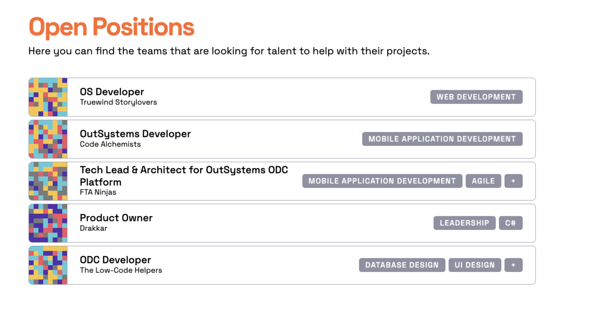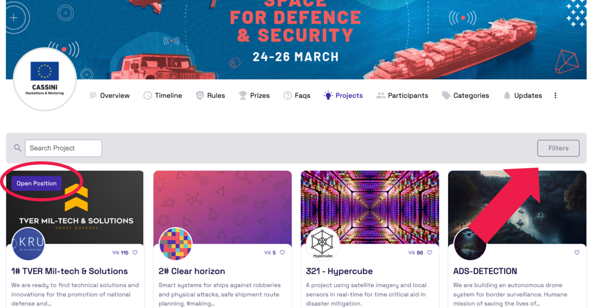Get ready for the 6th CASSINI Hackathon on 3-5 November!
The CASSINI hackathon is taking place simultaneously across 11 locations in Europe. For the 6th edition, Garage48 is proud to represent the Baltics and Nordics as a local organizer! Join us for the hackathon onsite at Palo Alto Club in Tallinn or virtually from wherever you are.
No prior experience working with data or space is necessary. Register for the hackathon and we'll bring you together with people whose skills complement yours.
🛰 WHAT IS THE CASSINI HACKATHON?
At the CASSINI hackathon, you'll have a unique opportunity to work with space data to prototype solutions for International Development & Humanitarian Aid. Whether you're interested in data, space, programming, humanitarian aid or development cooperation, come join us and build sustainable solutions that have the potential to solve challenges and/or become businesses.
You'll have unprecedented access to EU Space data sets for Earth observation (Copernicus), Satellite navigation (Galileo and EGNOS), Secure connectivity (IRIS² and Govsatcom) and Space situational awareness (EU SST). We'll have mentors to support you in finding, accessing and using the data.
🛰 TOPIC AREAS
There are three main topic areas we're looking for solutions in. If you don't have an idea that falls under these categories, don't worry! Join as an individual and join a team or submit your idea later.
→ Sustainable infrastructure
→ Food security and access to clean water
→ Forced migration
Read more about each topic area in the "Topic areas" tab.
Our partners are also working on putting together specific challenges within these areas as inspiration. These will address the most critical global challenges based on their experience working in the field.
🏆 PRIZES
The top three teams from across all hackathons will win 100 hours of expert mentoring from the CASSINI team.
In addition, we have some special prizes for the Garage48 edition participants:
🛰 WHO CAN JOIN?
Garage48 is the cross-Baltic local hub welcoming participants from Estonia, Latvia, and Lithuania. Participants from other EU member states, plus Norway, Iceland, and Switzerland can also join the hackathon. 🇪🇪🇱🇻🇱🇹
No previous space experience required. We were looking for determined innovators with a passion for developing sustainable solutions.
If you're a space enthusiast, visionary, UX/UI designer, data scientist, engineer, marketer, scientist, creative coder, entrepreneur, humanitarian aid worker, agriculturist, environmentalist, marine and coastal field experts, meteorologists, transport and logistic specialist, cleantech enthusiasts, student or simply a BIG THINKER - welcome onboard!
You're welcome to register as an individual or team, with an idea or without. After registration, you'll be invited to a Discord community where you can meet other participants and form a team.
🛰 TIMELINE
1 September: Registration opens HERE
31 October: Pre-event at the Software Defined Space conference. Find more info HERE.
3-5 November: Hackathon weekend!
9 November: Demo Day for the best teams
NB! It's not mandatory to take part in the pre-events.
🛰 REGISTRATION
→ Register for the hackathon by 26 October HERE.
For instructions, head to our "How to register subpage.
→ Join the Facebook event for updates and more info: https://fb.me/e/4HJ8rDy4Y
→ Questions? Email us via cassini@garage48.org
In the 6th CASSINI Hackathon, participants are challenged to create solutions that use European space technologies to support sustainable international development and help people in need.
Despite progress made in recent years, millions of people around the world still lack access to basic life necessities, hindering their ability to lead healthy lives. Better infrastructure, access to clean water and secure food supplies, as well as assistance in times of emergency are important to ensure vulnerable communities have the chance to thrive and grow. A deeper understanding of the effects of climate change will also contribute to a more resilient future.
By utilising Earth observation data from Copernicus, satellite positioning and navigation services from Galileo & EGNOS, and future satellite-based connectivity services from IRIS2 , the hackathon aims to bring about real change that improves the design and delivery of humanitarian assistance and international development support around the world.
🏢 Challenge #1: Supporting sustainable infrastructure development
A country’s infrastructure is critical to guarantee access to essential services. It drives economic and social growth, creating more job opportunities and a better quality of life. Energy, communication and transportation are examples of basic infrastructure that are often taken for granted but that many people worldwide still lack.
Space technologies can help us further explore, plan and maintain infrastructure developments, such as solar and wind power generation. Spacebased timing and communication technologies can support improved systems coordination and control, and in the case of energy, enable more efficient and reliable transmission and distribution of electricity.
You can dive into the areas of:
- Spatial planning & site selection for infrastructure development
- Renewable energy production forecasting
- Future-proofing transportation & mobility infrastructure
- Critical infrastructure monitoring and planning for remote communities
- Assess damages to infrastructure caused by natural disasters or conflict
💧 Challenge #2: Strengthening food security & access to clean water
Access to food and water is a basic human right that remains a significant challenge for many populations around the world. Climate change, unsustainable land-use practices, and global supply chain disruptions further aggravate these challenges. Anticipating humanitarian crises and managing often scarce resources are critical to strengthening overall access to food and water.
Space technologies can contribute to improving food security by optimising land use, supporting accurate yield forecasting, and increasing supply chain resilience. They can improve access to clean water by identifying groundwater sites, understanding global water cycles, and monitoring and mitigating the effects of floods and droughts. Overall, space technologies have the power to enable humanitarian actors to better anticipate and prepare for future crises.
Ideas can be focused on:
- Anticipatory action for extreme weather events, including impact-based assessments to the food value chain, water supplies, infrastructure and communities
- Agricultural yield forecasts and optimisation
- Logistics & resource allocation for emergency humanitarian assistance
- Land cover & land use monitoring
- Access and management of groundwater
- Monitor water quality parameters like algal bloom, cyanobacteria, suspended matter
🌎 Challenge #3: Understanding and forecasting forced migration
Natural and man-made crises threaten the livelihoods of millions of vulnerable people worldwide
every day. Rising sea levels erode shorelines, contributing to coastal flooding and increasing
groundwater salinity, while changes in rainfall patterns affect water supplies and the availability of
arable land in rural communities. War and conflict cause massive disruption to food and water
supplies, personal security and property ownership. As a result, residents in these vulnerable areas
are often forced to migrate in search of work or to ensure their safety.
Space technologies can help
us understand the impact of climate change on coastal and rural regions of less developed countries
with insights on population movement and land use/land change. They can also support the design
and delivery of humanitarian assistance to people in need.
Think about solutions related to:
- Digital tools and big data in migratory processes and population movements
- Planning, decision-making and resource allocation due to natural and man-made disasters
- Transportation and logistics to support displaced communities
- Impact of desertification in rural communities
- Monitoring coastal communities and erosion
Registration, idea submission and team formation for the 6th CASSINI hackathon takes place on the TAIKAI platform here: https://taikai.network/cassinihackathons/hackathons/intdev-humaid
The platform isn’t difficult to use but isn’t very intuitive and there are a few details to keep in mind, so we’ve put together instructions for you to make the process easier. If you have any questions, please contact us via cassini@garage48.org.
This page will cover:
- Registering for the hackathon
- Submitting an idea and inviting members to join
- Finding a team to join
Registering for the hackathon
Step 1: Create an account to join the hackathon
When you head to the registration page, you’ll be asked to log in or create an account to be able to join the hackathon. You can do so using your email or by connecting a Github, Gmail, Microsoft or LinkedIn account.
After logging in, the orange button will change to “join the hackathon” and you’ll be able to register.
Step 2: Register for the hackathon
The registration form is pretty straightforward. To register for the Garage48 hackathon in Tallinn, make sure to choose “Estonia” as your hackathon location.
PS! You don’t need to give consent for the processing of personal data outside of EEA. This is only required if you want to join the local hackathon in Ukraine.
Step 3: Add your skills to your profile
To finish your registration, you need to add skills to your profile. To do so, head to your profile overview by clicking on your profile picture in the top right corner of the TAIKAI menu. The skills section is in the left column.
If you want to fill in your bio and previous experience, feel free to do so. It’ll come in handy when you want to join a team.
Step 4: Enable matchmaking
If you want to join a team, you’ll have to enable matchmaking. You can do so by heading to the hackathon page and clicking on “Preferences” in the left column. This is also the place where you can edit your registration, cancel participation, or change the country in whose hackathon you’re taking part.
Submitting an idea
Have an idea for the hackathon? Awesome! To submit, head to the hackathon page and you’ll find a “Create project” button where you used to see “Join the hackathon”.
A pop-up will appear asking for the project name and description. Don’t worry, your project isn’t published straight away and you can edit this later!
If you’re registering as a team and your team members are already registered on TAIKAI, you can add them to your project via username. You’ll find your username after taikai.network/ in the URL on your profile overview. If they haven’t registered yet you can invite them via email later.
After you click “Create project” you’ll see a draft of your project. Here, you’ll be able to add a detailed description of your project and any relevant attachments.
NB! As a tag, make sure to add “Estonia” to join the Garage48 hackathon and choose the topic area you’re working on as a category.
When you’re happy with your project, publish it and start forming your team via the “Positions” tab. You’ll be able to list available project positions or invite team members by email.
Adding members to your team
There are three ways to find team members to join your project.
1. Applications to open positions
If someone applies for an open position in your team, you’ll be able to accept them in the “Positions” section of your project.
2. Recruit through the Participants tab
Alternatively, you can actively recruit participants through the “Participants” tab. To see the participants who registered for the hackathon in Estonia, choose the relevant tag. If you spot someone with relevant skills and they’ve enabled matchmaking, you can invite them to join your team via the button.
If they haven’t enabled matchmaking, but you’re interested in inviting them to your team, click on their name to go to their profile and message them directly.
3. Find members through the Discord server
After you’ve registered through TAIKAI, you’ll be able to join the Discord server. It’ll become more active as the hackathon approaches, but you can all introduce your idea in the #find-a-team channel.
Finding a team to join
There are three ways to find a team to join.
1. Matchmaking
In the Matchmaking tab, you’ll see a list of all open positions across all 11 hackathon locations. To learn more about the projects, click on the team name and you’ll be taken to the project page where you can apply for a suitable position.
2. Browsing through projects
When you look at all submitted projects, you’ll see an “Open positions” tag in the corner of the project’s cover photo if the team is still open for new members.
To see the projects submitted for the Garage48 hackathon in Tallinn, choose “Estonia” in the filters.
You also have the option to filter by topic area and sort by name or date submitted.
If you find a team with a suitable open position, apply for it and the team lead will then be able to accept or reject your application.
If you want to join a team with no open positions, you can send a message to the team lead through their profile to see if they’d be able to take you in. You’ll see all the team members on the project description page.
3. Find members through the Discord server
After you’ve registered through TAIKAI, you’ll be able to join the Discord server. It’ll become more active as the hackathon approaches, but you can all already introduce yourself and your skills in the #find-a-team channel.






























_block.png)